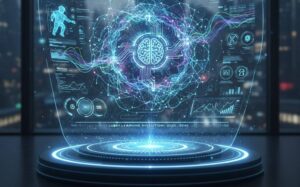Decentralized AI in 2025: The Future of Fair and Private Artificial Intelligence

Introduction: When AI Breaks Free From Big Tech
Imagine AI that doesn’t live in Google or Amazon’s servers, but runs across thousands of ordinary computers worldwide—more private, less biased, and impossible for any single company to control. This is decentralized AI, and by 2025, it could reshape how we interact with technology every day.
This easy-to-understand guide explains:



Decentralized AI Explained (Like You’re Talking to a Friend)
Imagine if AI wasn’t locked inside big tech companies like Google or Amazon—but lived everywhere, like on your phone, your neighbor’s laptop, or even your smart fridge. That’s decentralized AI!
How It Works (Without the Jargon)
Instead of one powerful brain (like ChatGPT’s giant servers), decentralized AI spreads the work across thousands of devices. Think of it like:
Bitcoin vs. Banks
Old way: Banks control all the money.
Decentralized way: No boss—everyone helps verify transactions.
AI version: No single company owns the AI; your device chips in to train it.
Neighborhood Watch vs. Police
Old way: Only cops handle security.
Decentralized way: Everyone keeps an eye out.
AI version: Your phone helps spot fake news or spam without sending data to Facebook.
Potluck Dinner vs. Restaurant
Old way: One kitchen feeds everyone.
Decentralized way: Everyone brings a dish.
AI version: Your smart speaker learns local slang, then shares just the patterns (not your voice clips) to improve AI for everyone.
Key Differences:
| Centralized AI (Today) | Decentralized AI (2025) |
|---|---|
| Runs on Amazon/Google servers | Runs on thousands of devices |
| Companies control all data | You keep your data private |
| Can be shut down easily | No single point of failure |
5 Ways Decentralized AI Will Revolutionize Tech by 2025
The future of AI isn’t locked inside corporate servers—it’s spreading to our devices, making tech smarter, fairer, and harder to break. Here’s how decentralized AI will change everything by 2025:
1. Truly Private Assistants
Problem Today: Alexa and Siri send your voice recordings to the cloud (and sometimes to human reviewers).
Decentralized Solution: AI runs only on your devices—your phone, laptop, or smart home hub—keeping your secrets offline.
Example Today: Mycroft, an open-source voice assistant that works like Alexa but doesn’t spy on you.
2025 Vision: Your phone learns your schedule, preferences, and even your jokes—without ever sending data to Google or Apple.
2. Bias-Free Algorithms
Problem Today: AI learns from Big Tech’s data, inheriting hidden biases (e.g., racist hiring algorithms, sexist search results).
Decentralized Fix: Thousands of diverse people train the AI—no single company controls what it learns.
Example Today: Ocean Protocol lets researchers share data fairly, creating more balanced AI models.
2025 Vision: A Wikipedia-style AI where doctors, teachers, and engineers worldwide collaborate to remove bias.
3. Unstoppable Services
Problem Today: Companies shut down AI tools (RIP Google Stadia, Amazon Care).
Decentralized Advantage: AI runs on a peer-to-peer network—no CEO can pull the plug.
Example Today: Bittensor lets users share AI processing power, keeping services alive even if a company fails.
2025 Vision: Your favorite AI doctor, tutor, or translator never disappears because it’s hosted by thousands, not one corporation.
4. You Get Paid for Your Data
Problem Today: Facebook and Google profit from your data—you get nothing.
Decentralized Model: Earn crypto or rewards when AI learns from your contributions.
Example Today: Numerai pays data scientists for improving its stock-market AI.
2025 Vision: Your smartwatch tracks your fitness habits, and you get paid every time an AI uses that data to improve health recommendations.
5. Disaster-Proof AI
Problem Today: A power outage or hack can crash critical AI (like hospital diagnostic tools).
Decentralized Safety Net: AI runs on thousands of devices—no single point of failure.
Example Today: Federated learning (used by hospitals) trains AI on patient data without storing it in one hackable server.
2025 Vision: Even during a blackout, emergency AI tools keep running on phones, solar-powered devices, and local networks.
How It Actually Works (Simple Breakdown)
Your Device does some AI processing
Network combines thousands of devices’ work
Blockchain verifies results fairly
No Company sits in the middle controlling everything
Analogy: Like Wikipedia—many small edits create something valuable, but no single editor controls it
Why This Matters to You
For Privacy:
No more “AI listened to my private conversation” scandals
Health apps that don’t sell your data
For Innovation:
Small developers can compete with Google
More creative AI applications emerge
For Reliability:
Weather/pandemic prediction AI that can’t be censored
Services that don’t suddenly vanish
Current Projects to Watch
Hugging Face (decentralized AI models)
SingularityNET (blockchain AI marketplace)
FedML (federated learning framework)
Challenges to Solve by 2025



How to Get Involved Now
Try privacy-focused AI apps (like Mycroft)
Support open-source AI projects
Learn about federated learning
Final Thought: Taking Back Control
Decentralized AI shifts power from Silicon Valley boardrooms to everyday users. By 2025, we might finally have AI that serves people—not corporations.


